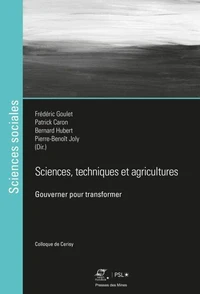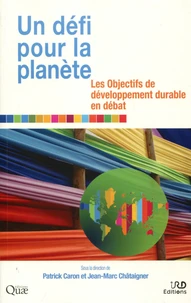Living territories to transform the world
Par : , , , ,Formats :
Disponible dans votre compte client Decitre ou Furet du Nord dès validation de votre commande. Le format Multi-format est :
- Pour les liseuses autres que Vivlio, vous devez utiliser le logiciel Adobe Digital Edition. Non compatible avec la lecture sur les liseuses Kindle, Remarkable et Sony
 , qui est-ce ?
, qui est-ce ?Notre partenaire de plateforme de lecture numérique où vous retrouverez l'ensemble de vos ebooks gratuitement
Pour en savoir plus sur nos ebooks, consultez notre aide en ligne ici
- Nombre de pages274
- FormatMulti-format
- ISBN978-2-7592-2731-0
- EAN9782759227310
- Date de parution03/07/2017
- Protection num.NC
- Infos supplémentairesMulti-format incluant ePub sans ...
- ÉditeurQuae
Résumé
What resources underpin the development of a territory? What does territorial management of resources mean? What specific characteristics and opportunities does territorial organization offer for agricultural production, regulation of sectors, and services? How are territorial public policies conceived and applied? But also, what are the limits of the territorial approach? How does a territorial approach refashion the frameworks of intervention for development? How do we implement and reinvent mechanisms to provide support, build skills, and promote production and good governance? How do we mobilize information systems, apprehend territorial dynamics, and encourage decentralized planning?
Using a wide diversity of case studies, the book explores how actors, scales and scopes of intervention interact in the development of rural spaces in the countries of the Global South, both at the local level and in the global perspective of the objectives of sustainable development.
The book brings together the experiences and views of more than 150 researchers and experts from CIRAD, AFD and their partners.
It is aimed at researchers, engineers, professionals in the countries of the Global South, as well as students and the wider public.
It is aimed at researchers, engineers, professionals in the countries of the Global South, as well as students and the wider public.
What resources underpin the development of a territory? What does territorial management of resources mean? What specific characteristics and opportunities does territorial organization offer for agricultural production, regulation of sectors, and services? How are territorial public policies conceived and applied? But also, what are the limits of the territorial approach? How does a territorial approach refashion the frameworks of intervention for development? How do we implement and reinvent mechanisms to provide support, build skills, and promote production and good governance? How do we mobilize information systems, apprehend territorial dynamics, and encourage decentralized planning?
Using a wide diversity of case studies, the book explores how actors, scales and scopes of intervention interact in the development of rural spaces in the countries of the Global South, both at the local level and in the global perspective of the objectives of sustainable development.
The book brings together the experiences and views of more than 150 researchers and experts from CIRAD, AFD and their partners.
It is aimed at researchers, engineers, professionals in the countries of the Global South, as well as students and the wider public.
It is aimed at researchers, engineers, professionals in the countries of the Global South, as well as students and the wider public.













